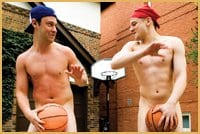Men are generally pretty obsessed with the two globes dangling between their legs. We caress them, scratch them and even dress them up in little party hats (maybe that’s just me).
But when it comes to injury or illness regarding our favourite boys, guys generally cross their legs and clam up.
Rob Salerno knows how uncomfortable it can be to talk about something like testicular cancer. Several years ago the writer (and Xtra West columnist) lost a close friend to the disease and he’s written about the experience in his play Balls, which opens at the Vancouver Fringe Fest Sep 4.
“I know it’s a little off-putting,” Salerno admits, “but it’s important because sexual health is something that a lot of men are uncomfortable talking about and we really need to.”
The idea for Balls came while Salerno and a companion spied a poster advertising Eve Ensler’s groundbreaking Vagina Monologues.
“The guy I was with said, ‘Why don’t you write a penis monologue, or a testicle monologue?’ I told him that if it was about testicles it would have to be a dialogue.”
What was originally intended as a joking response gave birth to a two-man play based on a short story Salerno wrote after his friend died of testicular cancer.
Paul and Bastian (Salerno and Adam Goldhamer) are two friends dealing with Paul’s recent cancer diagnosis. They’ve been close since childhood, despite some pretty heavy blows to their relationship.
“Bastian stole Paul’s girlfriend in high school,” says Salerno, “and Paul’s still a virgin. We do talk about the queer aspects, like is that why Paul hasn’t had any sexual experience? I think his sexual development has been put on hold because of cancer.”
Balls is just one of several queer-themed and queer-written plays featured in this year’s Fringe Fest.
In Putz, Andrew Bailey examines life as a lesbian’s best, straight male friend.
It’s a mostly true recollection of Bailey’s close friendship with a woman he calls Katrina. The two friends wile away date nights together, lamenting life in their respective closets: Katrina as a lesbian, and Bailey as a man living with mental illness.
“My psychiatrist ordered me to start dating my best friend,” says Bailey, who hadn’t yet clued into Katrina’s orientation. “It was part of cognitive behavioural therapy… if there’s something you’re afraid of doing, then you face it and do that thing.”
Unfortunately, Katrina’s thing was pretty much focused on other chicks’ boobies. But the two bonded over their respective secrets.
“I grew up with obsessive compulsive disorder with intrusive thoughts,” says Bailey. “So, for example, if you read a newspaper article about rape, a normal person would say, ‘Oh, how awful,’ but I would feel guilty or shamed by it, as though I was the sexual deviant.”
Confiding in a friend who also felt she was hiding a shameful secret made things a little easier for the reclusive guy.
“We thought if anyone knew about us, they wouldn’t talk to us,” says Bailey. “There was a part of me that really liked that first summer where only I knew about her, though. But I knew that, as she moved on, I would be less important to her.”
As Katrina made her way out of the closet, Bailey lived vicariously through his friend’s burgeoning sex life. “I was sort of like the gay best friend in reverse,” he says.
Eventually, as Katrina moved further away into out-and-proud life, Bailey began his own brave journey through mental illness. With the help of a therapist, he began exploring his own sexuality, finally reaching a point where he could write about the process with a degree of closure.
Looking back, he’s glad he could be of support to his friend during such a tumultuous period in her life, but also cops to some added fringe benefits.
“Other friends reacted to her being gay by getting her naked women magazines,” Bailey confesses. “She ended up giving the Playboys to me. I scored a lot of free porn.”
Developed at Toronto’s Buddies In Bad Times Theatre, Yoga Cannibal, the third queer play at this year’s Fringe Fest, has already received rave reviews.
“Welcome to Omega Orange Yoga Studio,” the play’s website reads, “and to our most successful yogini’s class. Yes, she may be heartbroken, but her success, fame and patented yoga can still lead almost anyone to enlightenment —for a price.”
“Monica used to be a struggling writer and poet,” explains playwright and actress Nisha Ahuja. “But when yoga became all the rage, she discovered that she has ‘value’ because her culture is commercialized into a version of what it really is.”
Thus is the basis for Yoga Cannibal, a comedy that takes a long, hard look at the current yoga craze and some of the problems that exist within it.
“The play is about the consumption of culture and the quest for spiritual enlightenment,” states Ahuja. “A lot of things that are sacred are co-opted. When you take the sacredness out of it and pervert it to something commercial, it is very hard to put the authenticity back in.
“Monica is a product,” she continues. “As a brown person she is a part of the market in that she has been asked to become something she’s not. She plays into the idea, even using an Indian accent when she talks about spirituality.”
Ahuja says the show —while very strong in its message —delivers its point in an endearing package of very physical comedy. “I have a riot doing this! I can be having the worst day and the show is so playful, fun and joyful. Even though Monica goes through different journeys, there is heart in there.”
The Vancouver Fringe Fest runs Sep 3-14 on Granville Island.
-With files from Denise Sheppard

 Why you can trust Xtra
Why you can trust Xtra


